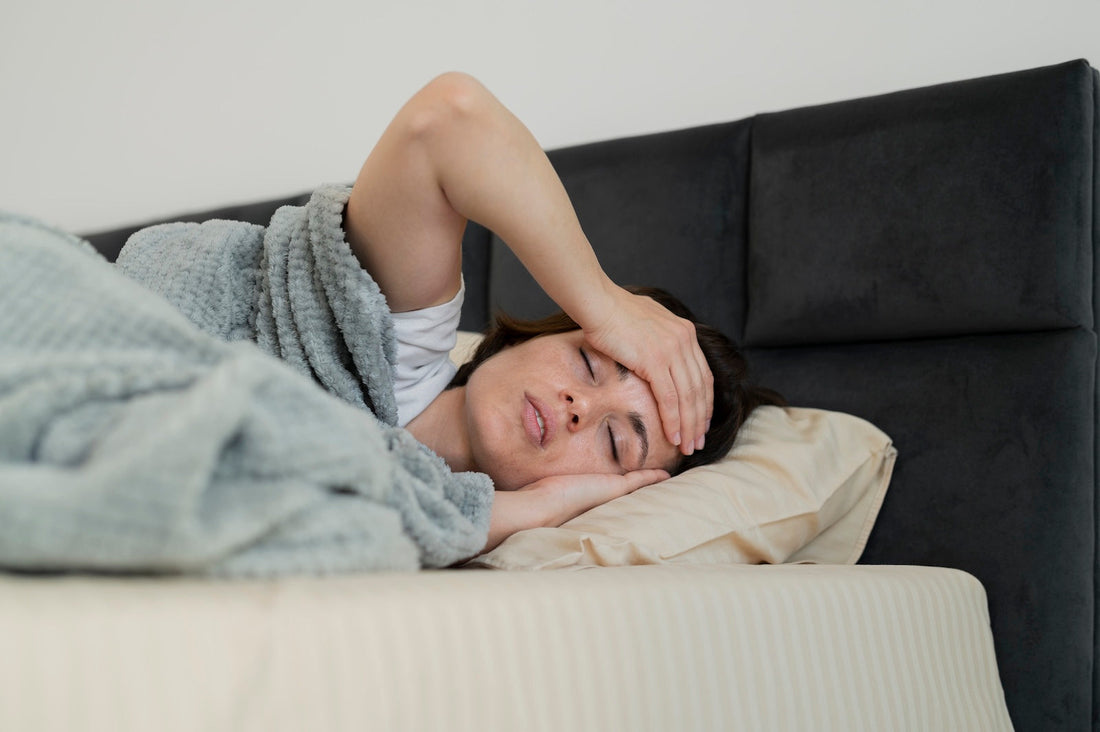
The Sleep Loss Epidemic
One of the most important things you can do for your health is get a good night’s sleep. A good night of sleep empowers the body to recover and wake up refreshed and ready to take on the new day. Not getting enough sleep can negatively impact your health, happiness, and even your life span. Your mattress plays an important role in helping you fall and stay asleep.
A mattress that is too firm, too soft, not supportive enough or just plain uncomfortable will often prevent you from getting the quality sleep you need. At Mattress Express, our sleep specialists will guide you to find the right mattress for you and help you get the quality sleep that your body needs. Stop by any of our locations or give us a call.
Americans Aren’t Sleeping Enough
Unfortunately, the average American gets less than seven hours of sleep every night. Sleep disorders, medical conditions, and mental health all can be blamed on not getting sufficient or quality sleep. This often begins during childhood, when night tremors, nightmares, sleep talking and sleepwalking are very common. Over 50 million Americans are affected by a sleep disorder, causing chronic sleep deprivation and negatively impacting a person’s quality of life.
Lack of sleep can also cause a lack of energy, trouble remembering things, a reduced attention span, slowed thinking, a reduced sex drive, poor decision-making, irritability, daytime sleepiness, and other mood changes. To aid in sleep, 23% of Americans turn to prescribed sleeping pills, while 22% use over-the-counter medications such as melatonin.
The Affect Sleep Disorders Have On Women
According to the National Library of Medicine at Pubmed.com, the risk of insomnia for women is as much as 40% higher than that of men.
Other statistics from the Sleep Foundation, report that an average of 69% of men and 76% of women over age 40 in the United States get up to go to the bathroom at least once per night. They also mention that premenstrual syndrome makes women at least two times as likely to report symptoms of insomnia before and during their period. At least 50% of pregnant women complain of having symptoms of insomnia during their pregnancy. These are just a few ways women suffer from sleep deprivation.
The Affect Sleep Disorders Have On Men
Men also suffer from insufficient sleep but in different ways than women. Men are more likely to suffer from sleep issues like severe snoring and sleep apnea. Snoring effects around 57% of men and 40% of women in the U.S. Snoring is due to a partial blockage of the airway during sleep and tends to increase as you age. Snoring ranges from simple to severe. Simple snoring is the most common and relatively harmless. Loud and severe snoring with snorts and gasps for air can be a cause for concern.
Men are twice as likely as women to suffer from sleep apnea as well. Sleep apnea occurs when the tissue in the back of the throat collapses during sleep and keeps air from getting into the lungs. These breathing pauses will wake you up and disrupt your sleep.
Dangers of Sleep Loss
Hypertension, heart attacks and strokes, obesity, diabetes, depression and anxiety can be results of an ongoing lack of sleep as are decreased brain function, memory loss, weakened immune system, lower fertility rates and psychiatric disorders. If sleep apnea is left untreated, it also can be directly connected to heart or lung disease, high blood pressure or diabetes.
Hypertension
Adequate sleep allows the body to regulate the hormones that cause stress and helps the body to recover from the day. Hypertension has been linked to lack of sleep because it is a direct response to the stress on a body that has no time to recover. Increased blood pressure, higher heart rate, and inflammation all put unnecessary strain on your heart.
Heart Attacks or Strokes
Adequate sleep also controls the parts of the brain that regulate the circulatory system. The circulatory system keeps the body stable by fighting disease, maintaining a normal body temperature, and managing a chemical balance. Lack of sleep can interrupt these systems and lead to numerous issues, including a heart attack or a stroke.
Weight Gain and Obesity
Cortisol is a stress hormone caused by a lack of sleep that induces anxiety, stress and frustration. This often contributes to emotional eating and bad nutrition. Another hormone increased by a lack of sleep is ghrelin. It is produced in the stomach and can actually increase a person’s appetite. Sleep deprivation also slows the body’s metabolism.
Diabetes
Research shows that inadequate sleep can disrupt the body’s processing of glucose. Cells use this for fuel and insulin production. Slow glucose processing often causes Type 2 diabetes.
Depression and Anxiety
Lack of sleep causes irritability, but long-term sleep deprivation has been linked to clinical depression. Low levels of melatonin, the hormone that regulates your sleep cycle and moods, are often found in people suffering from depression and also those who suffer from insomnia. Anxiety and panic attacks are also common reactions for people struggling with chronic sleep deficiency. Extreme sleep deprivation over an extended period of time can lead to symptoms including disorientation, paranoia and hallucinations.
Brain Fog and Memory Loss
 Sleep plays a fundamental role in creating and recalling memories. Sleep gives the brain time to organize itself and helps transfer information from short-term memory to long-term memory, therefore adequate sleep is crucial for memory recall. Your mental faculties may also drop drastically when the brain is not able to rest enough over a longer period of time. You may notice brain fog, fatigue, short temper, a lack of focus, poor problem-solving skills, and slower decision-making process. Sleep-deprived people also have problems with balance, reflexes and motor skills.
Sleep plays a fundamental role in creating and recalling memories. Sleep gives the brain time to organize itself and helps transfer information from short-term memory to long-term memory, therefore adequate sleep is crucial for memory recall. Your mental faculties may also drop drastically when the brain is not able to rest enough over a longer period of time. You may notice brain fog, fatigue, short temper, a lack of focus, poor problem-solving skills, and slower decision-making process. Sleep-deprived people also have problems with balance, reflexes and motor skills.
Immune System Deficiency
The immune system, like the rest of your body, performs best when you get adequate sleep. A prolonged lack of sleep can decrease your antibody response and make you more vulnerable to viruses like the common cold and flu.
Allergies
Your old mattress could house dust mites, which might trigger allergies. An allergic reaction like coughing, sneezing, a runny nose, and itchy eyes could interrupt your sleep pattern. Asthma sufferers may experience shortness of breath, chest pain or tightness, coughing, and wheezing. Whether you’re dealing with allergies or asthma, having dust mites in your bed can translate into another restless night.
Common Causes of Poor Sleep
Work commitments such as working night shifts, split shifts or long hours can interfere with quality of sleep that you are able to achieve nightly. Money worries, health concerns and other family stressors like caring for an infant, toddler or even an elderly parent or spouse can also affect our sleep quality or even interrupt it. Your sleeping environment can also affect your ability to sleep. Outside noises, bright lights, a room that has no air circulation, a partner or pet that sleeps hot or is a restless sleeper and even an uncomfortable mattress can prevent you from sleeping soundly. Medical issues such as chronic fatigue syndrome, chronic pain like fibromyalgia or arthritis, anxiety, depression, mental health disorders like bipolar or schizophrenia, obesity, bruxism or grinding teeth, and sleep disorders such as obstructive sleep apnea or narcolepsy can also be the reason for sleep deprivation.
Intentional sleep deprivation is a result of preferring entertainment, electronic devices, gaming or sometimes substance abuse over sleep. It’s most common with young adults or teens.
Steps Toward Better Sleep
There are a few things you can do to help you start getting the quality of sleep that your body requires.
Regulate Your Body Temperature
Your core body temperature is the number one fact that affects sleep quality. Your circadian rhythm is closely in tune with your internal body temperature. Higher temperatures are associated with waking hours so can put your body into “awake” mode, waking us up. Lower body temps create the feeling of relaxation. Keep your room cool by setting your thermometer cooler at night, open windows or turn on a fan or air conditioner. Running a fan even during the cooler months will help circulate the air.
Eliminate Noise and Other Disturbances

Keep to a Sleep Schedule
Creating a routine where you get up each day at the same time and go to bed at the same time can help your body and brain relax. Keeping an exercise and eating schedule will help you as well. Try not to eat or exercise less than three hours before bedtime.
Replace Your Old Mattress
Though every mattress has a different lifespan depending on the material, manufacturer, and usage, your body will often let you know when it is time to replace your old mattress. If you find yourself not falling asleep easily, not staying asleep or waking up with a sore back or overall achy body, it is probably time for a new bed.
Shop with us at Mattress Express
It is proven that you are able to improve your sleep quality by choosing the correct sleep surface for you. A mattress should support the healthy curvature of your spine, promote comfort, provide proper spinal alignment, allow body temperature control and fit your budget. Come to Mattress Express locations or check out our website and a sleep specialist will help you guide you to find the perfect mattress for you.
